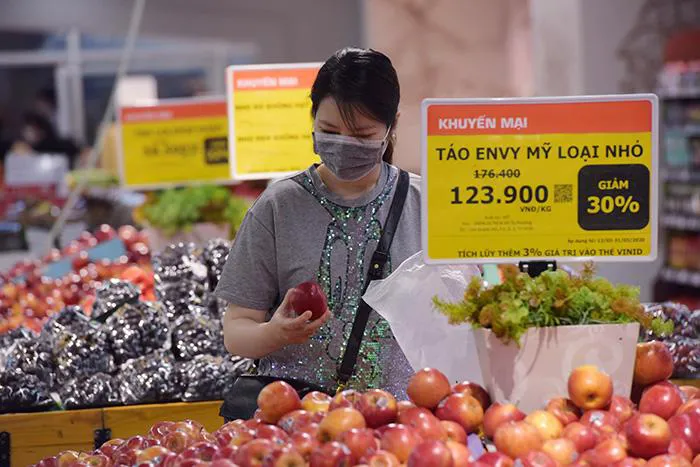Vietnam’s inflation under control: IMF
Vietnam’s prudent policies resulted in a prolonged period of high growth, price stability, and low public debt-to-GDP ratios.
The International Monetary Fund (IMF) forecast Vietnam’s inflation this year to rise to 3.9%, below the Government’s target of 4%.
| A customer at Vinmart's supermarket. Photo: Cong Hung/ The Hanoi Times |
The information was revealed in IMF’s latest report on Vietnam, which was released following the wrap-up of its Article IV consultation with the country.
According to the IMF, Vietnam’s prudent policies resulted in a prolonged period of high growth, price stability, and low public debt-to-GDP ratios.
This year, it predicted Vietnam’s GDP growth to expand by 6% and an inflation rate to rise to 3.9%.
“While inflation has recently picked up due to rising commodity prices and supply-chain disruptions, it remains well below the central bank’s inflation ceiling, given economic slack and relatively stable food and administered prices,” noted the IMF.
IMF’s view was shared by the World Bank with the latter’s report expecting the inflation to stay below the 4% target of the Government. The World Bank expected a surge in prices of gasoline and diesel has been the main reason behind the high inflationary pressure, while food prices have been also on an upward trend.
HSBC in a study released on July 6 expected Vietnam’s inflation to average 3.5%, but noted price pressure will become stronger in the second half of this year.
Based on its inflation forecasts, inflation will likely overshoot 4% from the fourth quarter of 2022 to the second quarter of 2023, increasingly calling for the SBV to start its monetary normalization, HSBC suggested.
Amid growing global concern over inflationary pressure, Vietnam’s consumer price index (CPI) grew at a modest rate of 2.44% year-on-year during the six months, while core inflation also expanded by 1.25%.
IMF, nevertheless, called for Vietnam’s monetary policy to be vigilant of rising inflationary pressure. “A surge in food and core inflation could de-anchor inflation expectations and compress households’ real incomes and spending,” it added.
Meanwhile, IMF’s report also highlighted Vietnam’s policy in mitigating Covid-19 impacts on socio-economic activities. “Starting in Fall 2021, an impressive vaccination drive—more than 77% of the population is now fully vaccinated, with booster shots and children’s vaccination underway—facilitated the shift from a zero-tolerance strategy towards living with the virus,” stated the IMF.
Policy support helped cushion the impact of Covid-19, while the government successfully maintained fiscal, external, and financial stability, it continued.
Structural reforms needed to improve the business environment
The IMF, however, observed that while a strong economic recovery is underway, it remains uneven, with the labor market lagging, rising financial sector vulnerabilities, and longstanding structural challenges.
The report called for agile policymaking, proactively adjusted to the pace of the recovery and evolution of risks.
It welcomed Vietnam’s Program for Recovery and Development and emphasized the importance of targeting, spending efficiency, and steadfast implementation.
Regarding the banking sector, IMF emphasized the importance of addressing problem loans, normalizing regulatory forbearance in a timely fashion, and closely monitoring real estate sector risks.
Over the medium term, bank capital positions need to be strengthened, and the macroprudential and private debt restructuring frameworks enhanced, stated the IMF.
The report called for continued efforts to boost domestic private investment and enhance social safety nets, and welcomed recent steps towards greater exchange rate flexibility and monetary policy modernization, and encouraged continued efforts in this direction.
IMF stressed the importance of structural reforms to improve the business environment, enhance productivity, and boost potential growth. It concurred that priority should be given to reducing labor skill mismatches, promoting digital transformation, and ensuring a level playing field, particularly for SMEs.
Hanoi’s consumer price index (CPI), the main gauge for inflation, expanded by 0.7% month on month in June, up 3.15% against late 2021 and 4.31% year on year. This resulted in the CPI expansion rate in the first six months at 3.25% year on year. Nine out of 11 commodity groups, which are components of the basket for CPI calculation, witnessed a month on month hike. |













